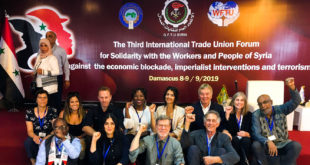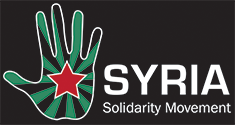
Over the last three days, around thirty human rights advocates and activists from several countries scrambled to get their tickets and visas to go to Syria. Most of them arrived today in either of the two cities, whichever was logistically easier. The Iranian NGO, International Union of Unified Ummah is generously providing most of the funding and the visas were obtained from the Syrian government through their good offices.
We are still introducing ourselves to each other and determining who has been able to come, so I hope to have a more complete list of the delegation tomorrow. I will do my best to send daily dispatches about our work.
The plan is to observe the election in as many places as possible and observe and interview voters, candidates and polling station workers. Already Syrians in Lebanon have made a profound statement of popular will by coming to vote in huge numbers during the expatriate voting. That part of the election was to take place May 28, but had to be extended because the embassy was unable to cope with the numbers.
This expression of popular will is potentially of the same order of magnitude as the “Syrian spring” demonstrations in 2011, and we are here to record as much of it as we can. Many of us are not trained journalists, nor do we have the means that are at the disposal of the mainstream media. However, we will do our best to tell the story that we see, and we believe that the result will be a very different perspective than that of the mainstream media.
We invite you to follow, and in the meantime, please take a look at the following articles published by two of the Syria Solidarity steering committee:
The Scaremongering of John Kerry
Why are They Afraid of the Syrian Elections?
Another group afraid of the Syrian elections is the Syrian American Council (SAC). This well funded lobby group claims to represent Syrian Americans. They have launched a twitter and Facebook campaign decrying the ‘Blood Election’. They have professional marketing and public relations, paid staff and support from neo-con and zionist interventionists in Congress. Still, their real support across the country seems thin. Last August and September 2013, they were promoting a US attack on Syria. They were not concerned with the massive bloodshed that would have resulted from that. Ironically they are decrying blood now when Syria holds a peaceful election.
In sharp contrast with SAC, alternative organizations such as Arab Americans for Syria (AA4Syria) and Syrian American Forum (SAF) are speaking with growing strength against our US tax dollars being used to destroy their homeland. As a measure of the depth of feelings, over 25 members of AA4Syria are flying to Beirut then traveling by land to Syria to vote in next Tuesday’s election. The same thing is happening in other countries which have prevented Syrians from casting a vote. Syrians who live in the Gulf are traveling all the way to Syria to vote as a sign of their commitment.
If recent history is a guide, there may be some kind of spectacular media event or atrocity in the coming days. The Syrian opposition and their handlers have executed PR stunts at critical times. If it happens here, the purpose will be to distract from the strong Syrian participation in the election and to attempt to renew the branding of Asad as “brutal dictator”.
 Syria Support Movement solidarity with the Syrian people
Syria Support Movement solidarity with the Syrian people



